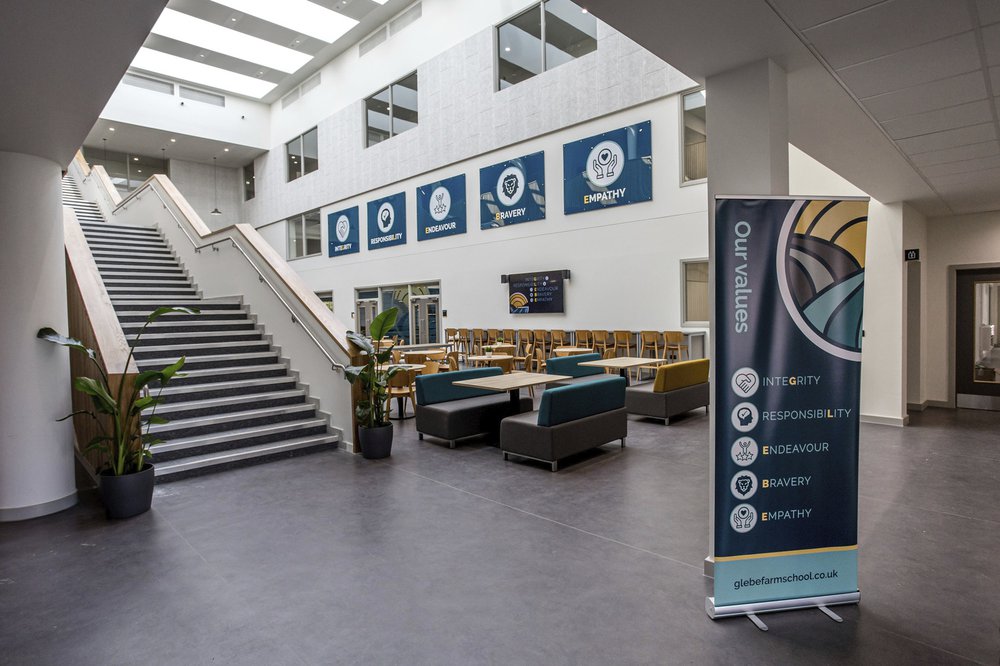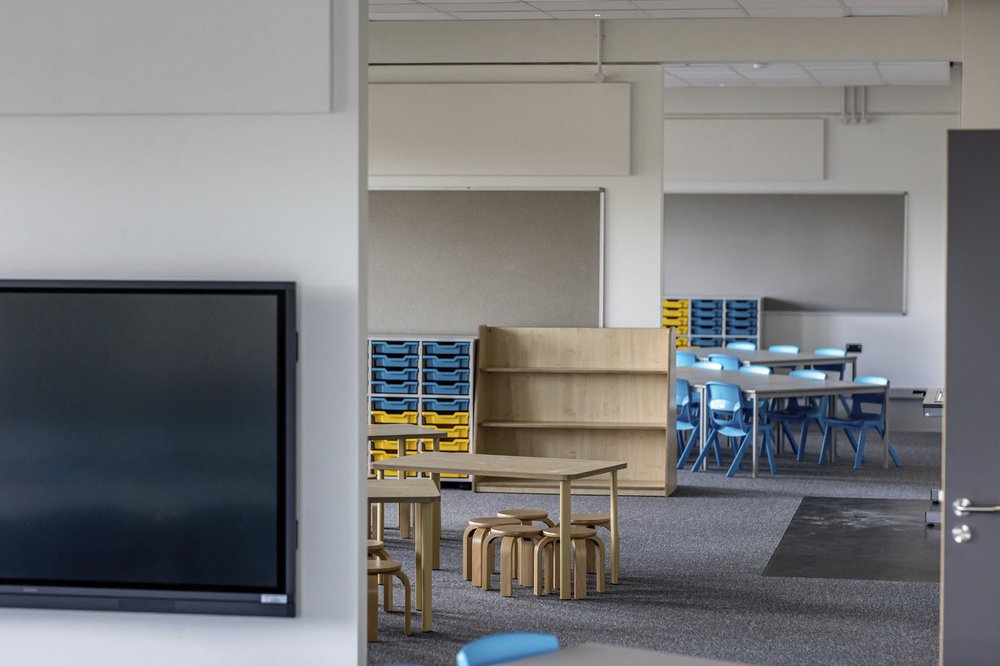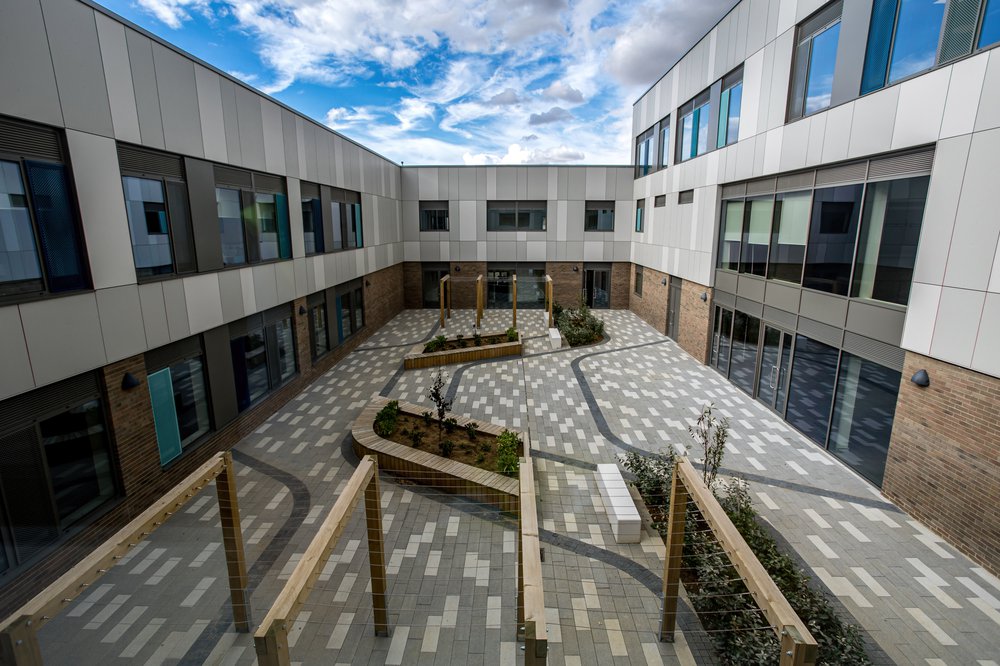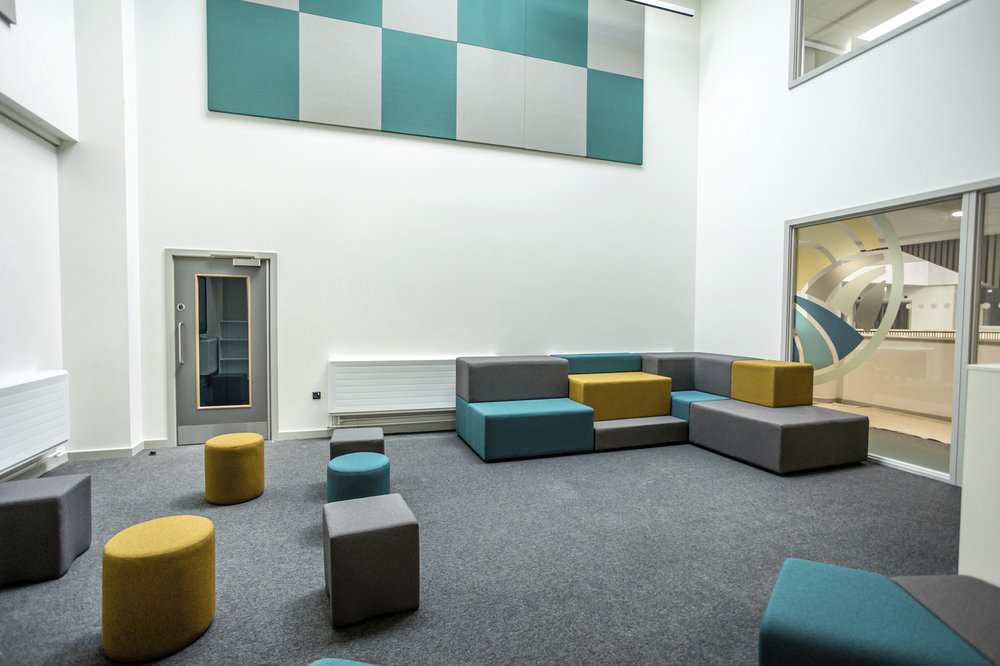Glebe Farm School
Glebe Farm All-Through School is an integrated, inclusive and sustainable school providing 39 nursery, 630 primary and 900 secondary school places. Procured through Pagabo’s Major Works Framework, it is the first fossil-free all-through school and major project delivered for Milton Keynes Council and the newly built housing estate in Glebe Farm.
Key Stats
- Procured through Pagabo
- 1500+ nursey, primary and secondary school places
- 40 tons of CO2 saved each operational year from eliminating gas
- Incorporation of Air Source Heat Pumps, solar panels and electrical curricular equipment
- 32 Photovoltaic panels installed to power site cabins, welfare units and CCTV cameras
- 840 trees donated and planted to combat carbon emissions
- HVO fuel for generator, to create 90% less on emissions compared to typically sourced fuel
- 360 metres of carbon neutral hoarding
At a Glance
Budget
£30.4 million
Completion
September 2022
Location
Milton Keynes
Framework
Pagabo
Sector
Education (All-Through)
Social value
£25.4m
Sustainability
40 tons of CO2 saved each year from eliminating gas
The initial concept to build a fossil-free school was proposed by the Inspiring Futures Through Learning Trust who wanted to create a facility that would not only cater for hundreds of new homes in the surrounding estate but help deliver on Milton Keynes Councils’ target of making the city carbon neutral by 2030.
This was a big challenge for the Northern Home Counties project team as there was no examples of fossil-fuel-free schools to replicate or take lessons learnt from. However, up to the challenge, the team were committed to the task in finding a solution to make the new school as sustainable as possible.
Our approach
The project was appointed to the team via the Pagabo Major Work’s Framework through a two-stage process. Despite this all taking place through the height of the pandemic, the turnaround time from submitting price to entering into contract and commencing on site was less than 6 weeks, with the whole build programme completing in 80 weeks. The success of this was down to the close collaboration the project team established from the onset.
Through using Morgan Sindall’s Intelligent Solutions approach, the project team engaged early with the Trust, Council and architects to develop an open and honest relationship. This was imperative for the success of the project given that the team were trial and testing innovations to see how the school could be designed and operated to be fossil-free. The team also engaged directly with specialist suppliers at an earlier stage than normal to gather their input and experience, which would in turn shape a number of key driving design decisions.
Milton Keynes Council (MKC) have been delighted by the way that the Morgan Sindall team have worked with us to progress the Stage 2 concept design, during a time of unprecedented circumstances.''
Maria Demmon, Project Lead Milton Keynes Council
Fossil-free design
The project team, working with the architects and supply chain, spearheaded a hugely innovative approach by using a gas-free design which eliminates the need for fossil fuels.
The project incorporates a number of sustainable features which allows it to be run entirely on renewable energy. For example, all the hot water for the school buildings is heated by air-source heat pumps (ASHPs), which allows heat to be absorbed from the outside air and power the heating and hot water throughout the school.
In addition to this, the school has 500 sq m of solar panels installed on its roofs to power all of its high-efficiency LED lights and generate additional power for the wider estate.
The thermal transmittance values of the windows, doors and all external structures are optimised to ensure as little heat loss as possible, helping to give the school an air permeability rating of less than three where current building regulations only require that new developments achieve a rating of five.
By incorporating these features, the school will save 40 tons of CO2 each operational year from eliminating gas.
Working innovatively with our suppliers to support carbon reduction
The construction process was also highly sustainable. The project team were driven to decarbonise site operations in support of Morgan Sindall’s Responsible Business Plan and 10 tonne Carbon Challenge initiative. The Glebe Farm School project team worked with ThinkHire to identify a sustainable, environmentally sympathetic, and cost-effective solution to off-grid power. The main objective was to significantly reduce the projects carbon footprint against the business target without impacting on the efficiency of the build.
They worked with ThinkHire to specify the Solartainer, an off grid solar power supply backed up by biofuel. Solar energy was harvested and stored in the battery pack meaning the generator only kicked in when depleted. To further drive carbon savings, the backup fuel specified was Hydrotreated Vegetable Oil (HVO) which produces 90% less emissions compared to a typically sourced fuel.
Significant carbon and cost savings were demonstrated over the hire period of 3 months compared with a standard diesel generator due to reductions in fuel required.
Other smaller innovations also included opting for 360 metres of carbon neutral hoarding which resulted in saving 12 tonnes of carbon. The team also planted 840 trees on the school grounds, which were donated by the Woodland Trust, to offset carbon emissions.
Check out some of the other carbon friendly innovations the team employed in the video below.
Every time I come to Glebe I feel a sense of pride with what the team have done here in terms of taking every single opportunity to minimise our carbon footprint in Milton Keynes and the area. It’s a great example of how we can focus on our carbon net zero objectives for 2030’’
Dave Rowsell, Area Director, Northern Home counties
Gallery
Related News
NEWS

Steel signing celebrated at Canterbury’s Pilgrims’ Way Primary School
Pupils, parents and stakeholders held a steel signing event this week at Pilgrims’ Way Primary School in Canterbury.
NEWS

Social Value report - December 2024
Click here to see the latest news on what's been happening in the Greenwich community whilst the team have been on site delivering Woolwich Leisure Centre
NEWS

Morgan Sindall launches first construction Academy with East Kent Colleges Group
A ceremony has been held to mark the opening of Morgan Sindall Construction’s inaugural Academy at EKC Canterbury College, which has been developed through a new partnership with East …









